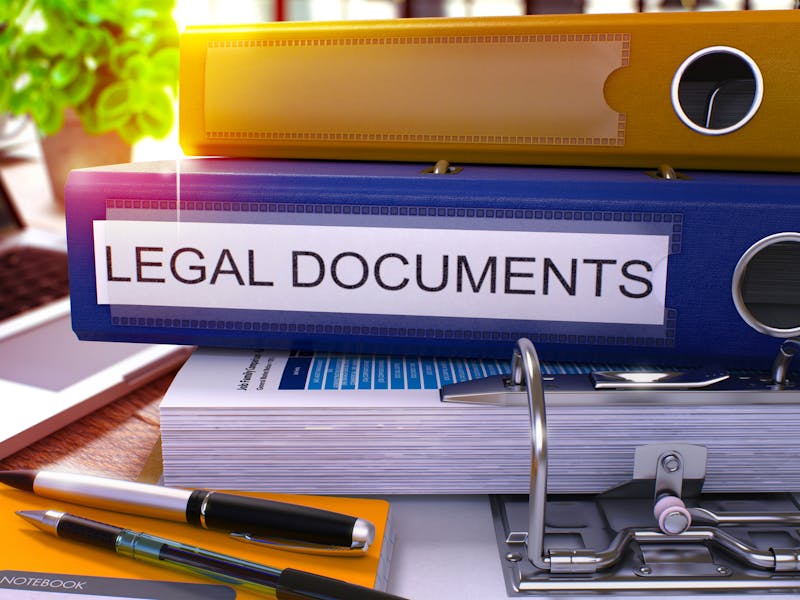You might also assume that you have your family to protect you as well. When you were younger, your parents’ loving advice guided you through life’s challenging decisions. Now, as an aging adult, you might presume that your own family will help guide the (sometimes difficult) decisions regarding your own medical, financial, or end-of-life matters.
But by default, laws are in place to protect all citizens, including:
- those who are temporarily unable to speak for themselves or have lost the capacity for making decisions regarding their own medical care and managing their personal finances.
- and those who have passed away and haven’t made their wishes known regarding the distribution of assets from their estate.
Medically-Related Documents
Clearly, you’d prefer not to place your loved ones in the difficult position of making decisions related to your life support and end-of-life medical care. Although sobering and discomforting, it's a caring gesture to make such decisions for your family in advance of a crisis.
Most importantly, these preferences should be legally recorded in advance of any medical or mental crisis or decline. Let’s explore the different legal documents that will uphold your wishes should such a life-threatening health issue arise.
- Medical Power of Attorney
Key Point #1: Get a medical power of attorney or POA to have a loved one make medical decisions on your behalf based on your wishes
- Advance Healthcare Directive
An Advance Healthcare Directive (or Medical Directive) outlines decisions and specific instructions for your appointed Medical Power of Attorney to follow should you be unable to make medical decisions for yourself. Circumstances for providing (or withholding) specific treatment near the end of life are typically outlined in this type of legal document.
Medical scenarios that call for artificial life support or resuscitation should be covered, with your preference for treatment in this regard. DNR (Do Not Resuscitate) or DNI (Do Not Intubate) orders are created by physicians at the request of their patient. These specific orders are typically included in an Advance Healthcare Directive(AHD) and should be disclosed to your family and designated Medical Power of Attorney.
Key Point #2: Complete an advance healthcare directive as this document clearly states what your wishes and desires are for your power of attorney to carry out.
- Medical Release Forms and Information
Privacy of personal healthcare records and information is protected by the Health Information Portability and Accountability Act (HIPAA), which was signed into law in 1996.
Medical providers carry the burden of protecting health records and require consent from their patients to release sensitive health information to an authorized family member or agent. A signed, completed HIPAA authorization form (sometimes called a medical release form) should be on file with every medical provider (including long term care residences) which allows them to share your healthcare information with those you specify.
You do not need to engage an attorney to file HIPAA forms, but be sure to list your Medical Power of Attorney on any new form that you’re requested to complete.
Your up-to-date listing of prescribed medications, over-the-counter drugs, supplements, and vitamins (with dosage and frequency) and note of any food or drug allergies is an important reference to provide to medical professionals, particularly in the case of an emergency.
Be sure to keep this list handy (in your wallet or on the refrigerator) and share with caretakers and family. Update the list when changes are made to your prescriptions.
Key Point #3: Get a HIPPA medical release form completed so your medical information can be shared as you wish
- Medical Insurance Information and Emergency Contacts
List all medical insurance policy and contact information, including private medical insurance, Medicare, Medicaid, long-term care policy, and veterans benefits. Log all insurance company names, policy numbers, contact information and identification cards in one folder or document for quick and easy reference.
Create an emergency contact list with the names, addresses and contact phone numbers of people who should be notified if you have a medical or other unexpected emergency. The list should also include healthcare providers, pharmacy information, insurance policies (healthcare, home and auto).
Key Point #4: Make a list with all of your medical insurance policy information and healthcare provider contact info for easy reference.
Financially-Related Legal Documents
- Power of Attorney for Finances (POA)
A Financial Power of Attorney is sometimes called an Order of Guardianship of Property, which is a legal document that designates your agent, the person who you have appointed to make financial decisions for you in the event that you become unable to manage your financial affairs.
An important distinction is that of a Durable Power of Attorney (DPOA). This document specifies that the authority of the agent continues in the event that the principal (you) becomes incapacitated, which bypasses the need for someone to go to court to be appointed as a guardian of your property. You can appoint one person as the Durable Power of Attorney for financial decisions and a different Durable Power of Attorney for medically-related decisions.
Key Point #5: Consider appointing a financial power of attorney which allows the person you choose to make financial decisions on your behalf.
- Financial Accounts Information
Gather, organize and share information about your financial accounts with your trusted Power of Attorney for Finances. Make it a point to review this information on at least a quarterly basis to keep aligned on any changes that may have occurred. Here’s a list of items to cover:
- Bank account(s)
- Credit cards
- 401k
- Pension
- Tax returns and W-2 forms
- Safe deposit information and keys
- Online account user IDs and passwords
Key Point #6: Organize all of your financial account information such as bank accounts and retirement accounts for your power of attorney and update it when it changes.
Estate Planning and Other Personal Documents
An estate plan is the legal framework that you establish in advance of your death to assure that the distribution of your assets transfers smoothly to your designated heirs.
An inevitable event, it’s often uncomfortable to discuss the event of your death with your family. But an informal discussion regarding your estate wishes (along with burial or cremation preferences) can guide your family to make the right decisions in their time of grief.
We’ll cover the basics here, but be aware that laws vary from state to state and there are different kinds of estate plans. To help decide what estate planning documents are most appropriate for you, consult with an estate planning attorney for recommendations.
- Revocable Living Trust
A revocable living trust is a legal arrangement that is used to manage your assets and designate beneficiaries of your assets. This type of trust can be changed (revoked) at any time. One benefit of a living trust is that it avoids probate, which is a legal process that verifies and inventories assets and pays your estate’s debts, sometimes adding costs and time to resolve.
Once your revocable trust is established, you can transfer any assets (bank accounts, investments, deeds, automobile titles, etc.) to the trust that you want included in your estate. The assets in the revocable living trust belong to the trustmaker (you) until your death.
Key Point #7: Consider creating a revocable living trust to manage your assets and avoid probate.
- Living Will
Without doubt, a will is the most familiar type of estate planning document. Chances are, you had a will drawn up years ago with the specific purpose of designating guardians for your minor children in the event of your death. But that’s not the only reason for a will.
Simply stated, a living will is legal documentation for how you’d like your property (assets) distributed among your named survivors. A will acts as a “spillover” for distributing any assets that are not included in your living trust, so it’s often advised to have both a trust and will drawn up at the same time.
Key Point #8: Create a living will which determines how your assets are distributed to your named survivors.
- Life Insurance Policy Information
Information regarding your life insurance policies (insurance company name, policy number and contact information) should be documented and shared with a trusted relative, perhaps your Power of Attorney for Finances. Upon your death, the insurance company will need to be contacted and given pertinent information in order to provide the death benefit to your beneficiaries.
Key Point #9: Organize your life insurance policy information for your relative or power of attorney to manage to help claim the benefits
- Other Personal Documents and Information
Here’s a listing of other personal documents and information that you may need for long term care applications:
Birth certificate
- Social Security card
- Marriage (and Divorce) papers
- Military records
- Passport
- Deed to your home
- Car title and registration
Key point 10: Remember to keep your other documents in order too such as birth certificates, social security cards, car title, and anything like that to help in coordinating any life, financial, and medical planning.
Top 10 Takeaways: Must-Have Legal Documents and Important Papers for Entering Long Term Care
As you age, you’re more likely to need some sort of care or assistance from outside the family. In the case of a sudden illness, a long term care application process can be stressful and difficult for your family to navigate.
The bottom line is that you’ll ease the burden on your loved ones by getting organized and legally prepared for long term care should you actually need it. Arrange to meet with a qualified elder law attorney to draw up the documents that’ll legally line out your wishes and smooth the transition for you and your family.
For your reference, here’s a quick checklist of the legal documents (designated with an *) and important papers seniors should have organized and readily available:
1. *Medical Power of Attorney (POA)
2. *Advance Healthcare Directive
3. Medical Release Forms (HIPAA) & List of Medications
4. Medical Insurance Policies
5. *Power of Attorney for Finances
6. Financial Accounts (Banking Institutions, 401k, Safe Deposit Box, etc.)
7. *Revocable Living Trust
8. *Living Will
9. Life Insurance Policies
10. Other Personal Documents (Birth Certificate, Driver’s License, etc.)




